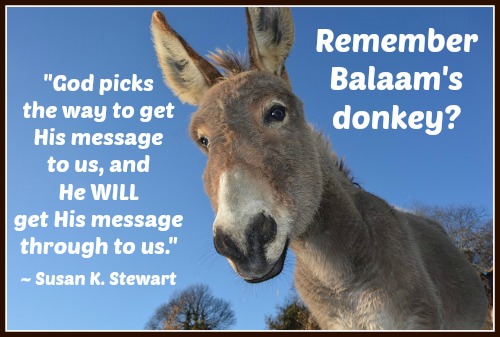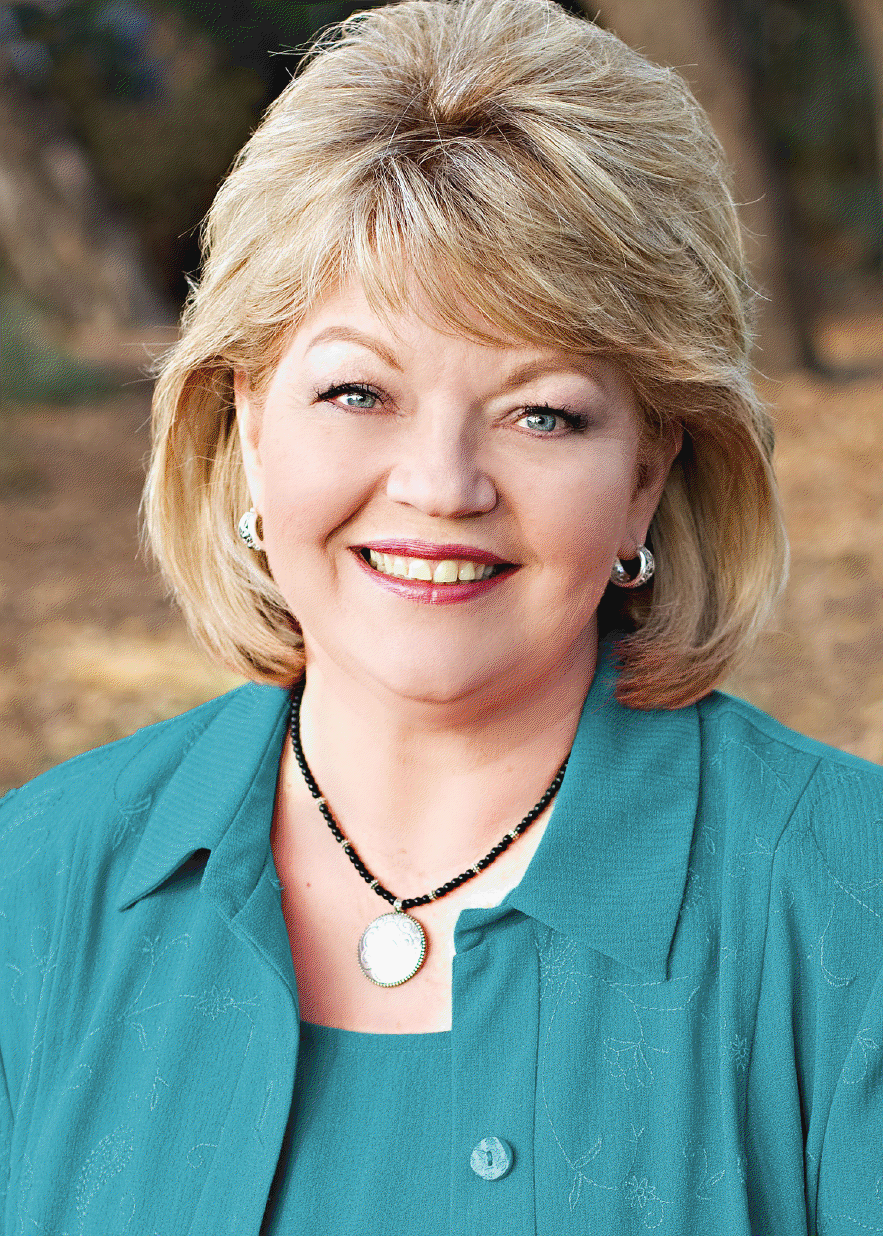Listen to Your Donkey!
Susan K. Stewart is practical and wise. She often sees lessons in the simplest things. In this Spiritual Growth UPGRADE, she encourages us to listen for God's voice in His Word, but also in other "messengers" He might send to us.

"Have you heard the story of Balaam’s donkey (Numbers 22)—the talking donkey?" Susan said. "Recently I dug a little deeper and learned more about the circumstances that prompted this animal to speak."
I (Dawn) have often thought this was one of the strangest accounts in the Bible. But Susan sheds some insight on this remarkable story.
Susan continues . . .
Balaam was a prophet who didn’t always put the Word of God first in his life.
Balak, king of Moab, was troubled by all those Israelites roaming in the desert, and he feared losing his kingdom to them. He decided the best thing to do was get a prophet of God to curse the Hebrews.
Balak chose Balaam.
On Balak’s first attempt to entice Balaam, God tells Balaam not to go and not to curse Israel. Balaam tells Balak’s messengers God won’t let him go, but fails to mention the not cursing part.
Balaam was partially obedient. He omitted the part he didn’t really agree with.
Balak was not a man to be stopped. He sent a second group of emissaries appealing to Balaam’s love of money. Once again, Balaam said he needed to talk to God.
We know God had already given his instructions: Don’t go. Don’t curse.
God let Balaam have his way, but God wasn’t happy about it. In fact, Scripture tells us God was angry (Num 22:22). God allowed Balaam to go with Balak’s servants; God still forbade the cursing of Israel.
The next morning, Balaam saddled his now famous donkey and rode off to Moab.
God sent an angel to block Balaam’s path to self-destruction. This angel had his sword drawn, ready for battle. The angel wasn’t bringing a message of glad tidings or joy. The heavenly creature was bringing warning and was prepared to enforce God’s command.
The donkey did what any smart creature would do: She stopped.
The donkey wasn’t being stubborn. True to her nature, she was being cautious. Why would anyone want to move forward in the path of God’s messengers brandishing a sword?
Balaam beat the creature until she spoke up.
Aren’t we guilty of not heeding God’s instructions?
How often do we think partial obedience is fine?
Too often, we, like Balaam, press forward with our plan presuming the blessing of God. Can you not see God on his throne slapping His forehead: “Didn’t I tell her not to do that?”
I’m thankful God has not chosen to send a warrior angel to stop me. I’m sure I would cower much like that little donkey did. Still I wonder, would I be like Balaam and lash out at those around me, those who try to warn me, instead of looking at the problem?
I’m afraid sometimes I’m a Balaam.
What can we do to NOT be a Balaam?
1. Listen to God.
God spoke directly to Balaam.
Oh, how many times I wished to hear directly from the mouth of God. My goodness, I’d accept an email. I like to think that, unlike Balaam, I would heed God’s direction.
2. After hearing God’s Word, follow His direction.
How many times does God speak to us in various way, but we don’t really listen? It doesn’t have to be big commandments, like don’t steal or murder. It can be a small thing, like don’t go to that town.
3. Follow God’s instructions—completely.
Too often we pick the parts we like and ignore what we don’t.
This is only partial obedience, and it can land us in a mess with only one way out—obeying God fully, which we should have done in the first place.
4. Don’t rush in as a fool.
Satan knows our weaknesses and uses them against us.
Balaam had a weakness for money and acclaim. Satan used that to get Balaam to do his bidding. He foolishly rushed to satisfy his weakness, no matter the cost.
5. Open your eyes.
Balaam was focused on his own gain, not on God’s instructions. He could only see what appealed to him: gold and fame.
He was blind to anything from God, even a sword-wielding, angelic warrior.
6. Look for God’s messenger.
God picks the way to get His message to us, and He will get his message through to us.
Balaam was so set on doing things his way, he didn’t see the godly messenger. It took the little donkey.
God uses what we will heed.
7. Stop.
We must stop whatever it is we are doing when we can’t go further. God may be blocking the way.
Stop, rethink, pause and pray.
Don’t try to keep pushing forward. Rest and seek God.
Sometimes it takes the inconsequential—like a meek, little donkey—to get our attention.
We need to listen.
When God opens the mouth of YOUR donkey, are you listening?
Susan K. Stewart, Acquisition Editor with Elk Lake Publishing, teaches, writes, and edits non-fiction.  Susan’s passion is to inspire readers with practical, real-world solutions. Her
Susan’s passion is to inspire readers with practical, real-world solutions. Her  books include Science in the Kitchen, Preschool: At What Cost? and the award-winning Formatting e-Books for Writers. Her latest book, Donkey Devos: Listening to Your Donkey When God Speaks, is scheduled to be released in the summer, 2020. You can learn more at her website—www.practicalinspirations.com.
books include Science in the Kitchen, Preschool: At What Cost? and the award-winning Formatting e-Books for Writers. Her latest book, Donkey Devos: Listening to Your Donkey When God Speaks, is scheduled to be released in the summer, 2020. You can learn more at her website—www.practicalinspirations.com.
Graphic adapted, courtesty of JacLou DL at Pixabay.
 Post a Comment → Posted on
Post a Comment → Posted on  Saturday, February 29, 2020 at 10:00AM
Saturday, February 29, 2020 at 10:00AM 





